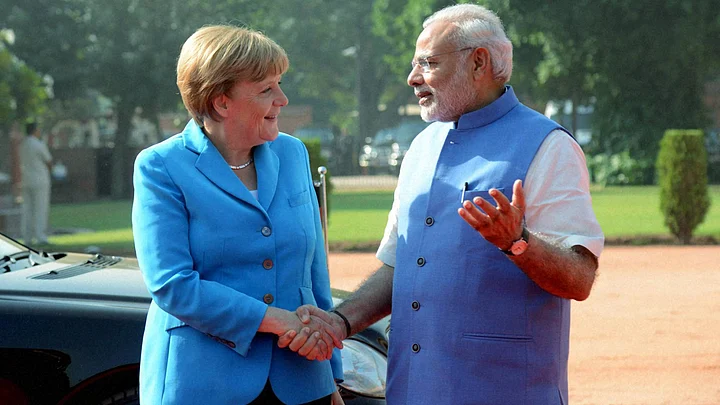German Chancellor Angela Merkel arrived in Delhi on Sunday, with a delegation that includes some of Europe’s major business leaders and predictably the bilateral focus is on trade, investment and manufacturing opportunities that can be of mutual benefit to the two nations in the long run.
The more recent Volkswagen scandal over automobile emission transgressions has cast a cloud over the German corporate sector but hopefully this will be transient. Chancellor Merkel is no stranger to unexpected challenges and her track record as a German leader who has combined principle with pragmatism in a prudent low-profile manner has been established over the years through her firm and deft handling of the Greek fiscal crisis and, in the last few months, the Syrian refugee crisis.
While Germany is acknowledged as the world’s fourth largest economy (after the US, China and Japan), what is perhaps not adequately noticed is the steady enhancement of Germany’s geopolitical and strategic profile in the complex turbulence associated with the early 21st century.
Germany commemorated 25 years of its historic unification that took place in 1990 on October 3 and this political consolidation was almost co-terminus with the dissolution of the Soviet Union and the end of the Cold War a year later.
Angela’s Itinerary
- Angela Merkel will be accorded a ceremonial welcome at the Rashtrapati Bhavan
- She will also visit Rajghat to pay tribute to Mahatma Gandhi
- Before delegation-level talks, PM Modi and Merkel will have one-on-one meetings
- Merkel will also call on President Pranab Mukherjee
The Merkel Trait
In the intervening years Germany has emerged as the economic powerhouse of Europe and progressively acquired a distinctive politico-diplomatic contour. While not being a permanent P5 member of the UN Security Council (like France and UK) and being a subaltern US military ally within the NATO fold, Berlin in the last 15 years has carved a geopolitical niche for itself in a quiet and commendable manner.
This was most visible in the ill-advised US led war against Iraq in 2003 when Germany did not blindly endorse the White House. Subsequently, Berlin acted as a bridge with Moscow and Merkel’s own East German pedigree is cited as one of the reasons why she brings an empathetic texture in interactions with the Russian bear.
The most successful achievement for Germany has been the role it has played in the nuclear rapprochement with Iran. The talks with Tehran were held under the umbrella of the P5 plus 1 – the latter being Germany – and this to my mind is illustrative of the manner in which Berlin has enhanced its geopolitical credibility in a quiet but methodical manner. Merkel trait?
In relation to the continuing violence and bloodshed in Afghanistan, the German contribution has been steadfast and the appreciation of the challenges that radical religious extremism and related terrorism poses to Europe has been appropriately internalised by Berlin. With a large Muslim population and the increasing number of refugees from West Asia and the Maghreb expected to touch one million this year, Germany has a first-hand experience of the many security challenges that confront the Indian sub-continent.
This geopolitical and strategic contour of Germany has many similarities with India. Both countries are part of the G4 (along with Japan and Brazil) that seek admission into the UNSC and have been trying – with limited success – to harmonise the post 1945 global strategic framework.
Concerted Efforts On Security
The proliferation of WMD (weapons of mass destruction) has been an area of concern for Germany and it must be noted that both countries have held very divergent positions over the years. I recall a Track II meeting in October 1996 when the first Indo-German strategic dialogue was held and the invalid certitude that our interlocutors brought to the nuclear issue. This was in marked contrast to the position adopted by France at the time. In short, there have been certain dissonances in the bilateral relationship on matters of strategic import.
However, in the last five years, there has been a concerted attempt by both countries to enhance their geopolitical engagement with a focus on security and strategic issues. Germany has to take a call on what kind of Asia would advance its abiding interests (focus only on China) and Delhi must find merit in an expanded strategic bandwidth that goes beyond the US and Russia.
It is instructive to note that at the perceptional level Germans have the most negative image of India (68 percent) and it is moot to ask if a robust bilateral relationship can be sustained without addressing this disappointing characteristic. The Dadri lynching and the right-wing orientation of the NDA government must cause deep anxiety in the visiting German delegation.
The Modi-Merkel team have a lot of hard work ahead but the results will be worth the effort.
(The writer is a leading expert on strategic affairs. He is currently Director, Society for Policy Studies.)
(At The Quint, we question everything. Play an active role in shaping our journalism by becoming a member today.)
